My Army Recruiter SSG Constantine. He went above and beyond the call of duty to get me to join. I was a hard-headed, troubled teenager.
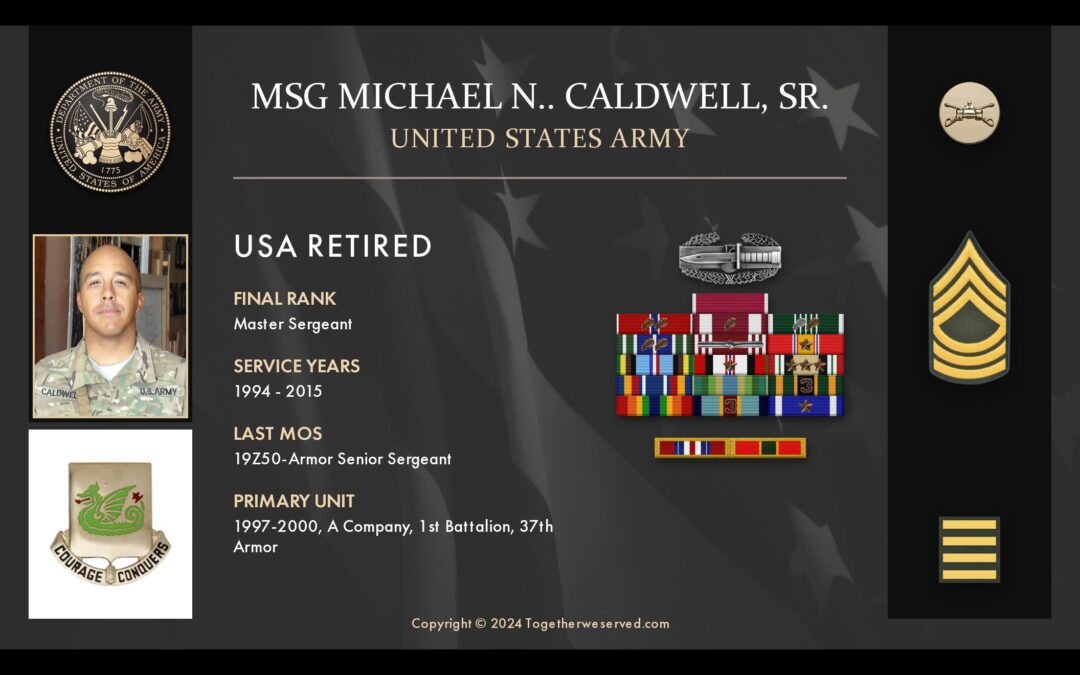

My Army Recruiter SSG Constantine. He went above and beyond the call of duty to get me to join. I was a hard-headed, troubled teenager.

I wish I could say I dreamt of being a Marine since I was a young child, however, that wasn’t the case. In fact, I was well into my senior year at John F. Kennedy Catholic high school before joining the armed services ever entered my mind.
My best friend, Kevin Hendricks, was visiting the local USMC recruiter quite often just to hang out and he asked if I wanted to tag along. It wasn’t long thereafter that I knew the Marine Corps was my ticket out without having to spend 4 more years behind a desk at some faraway college. So it is without a doubt that my recruiter, Sgt Mark Cross was the single most important person who influenced my decision to join the Corps. I’ve heard some real “horror stories” about recruiters but this guy was top-notch and NEVER lied or painted a rosy picture of how things would be in boot camp. For that, I am forever thankful!
In full disclosure, the girls he introduced me to and the beer he bought me didn’t hurt either – Semper Fi, Sgt Cross!
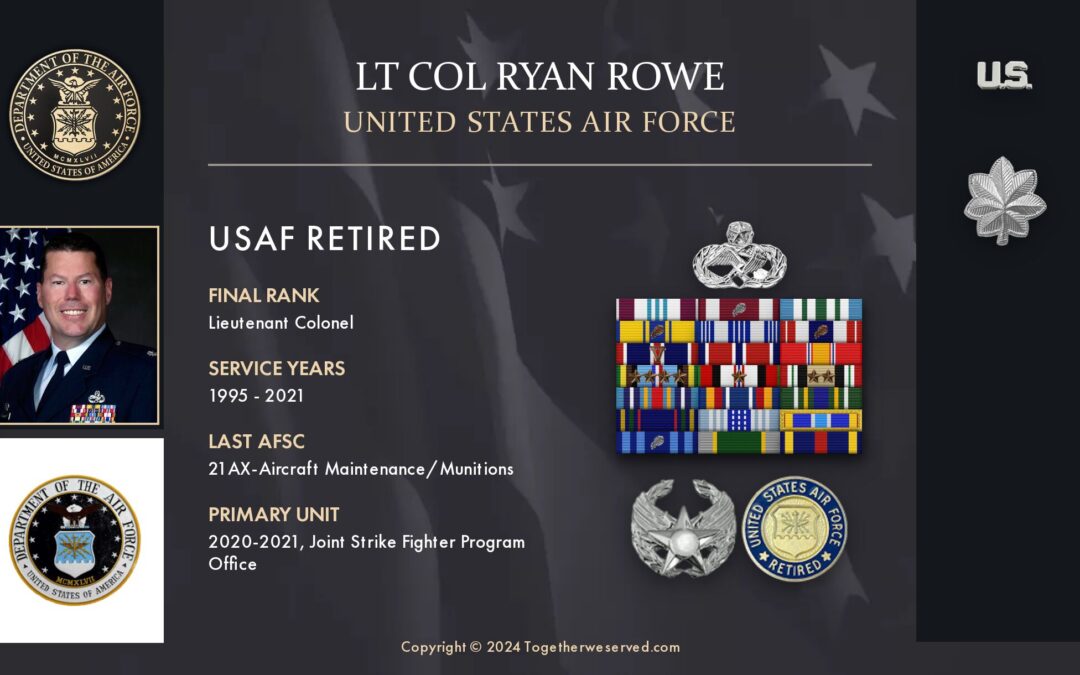
PRESERVING A MILITARY LEGACY FOR FUTURE GENERATIONS The following Reflections represents LT COL Ryan Rowe's legacy of his military service from 1995 to 2021. If you are a Veteran, consider preserving a record of your own military service, including your memories and photographs, on Togetherweserved.com (TWS), the leading archive of living military history. The following Service Reflections is an easy-to-complete self-interview, located on your TWS Military Service Page, which enables you to remember key people and events from your military service and the impact they made on your life. Start recording your own Military Memories HERE. Please describe who or what influenced your decision to join the Air Force. Cadet Rowe I had always had an interest in military things. I was the kid who never stopped playing with GI Joe's! My dad was in the Navy, and I enjoyed his stories. But, in the end, it was a personal decision based on patriotism and wanting to give back. And maybe, also looking...
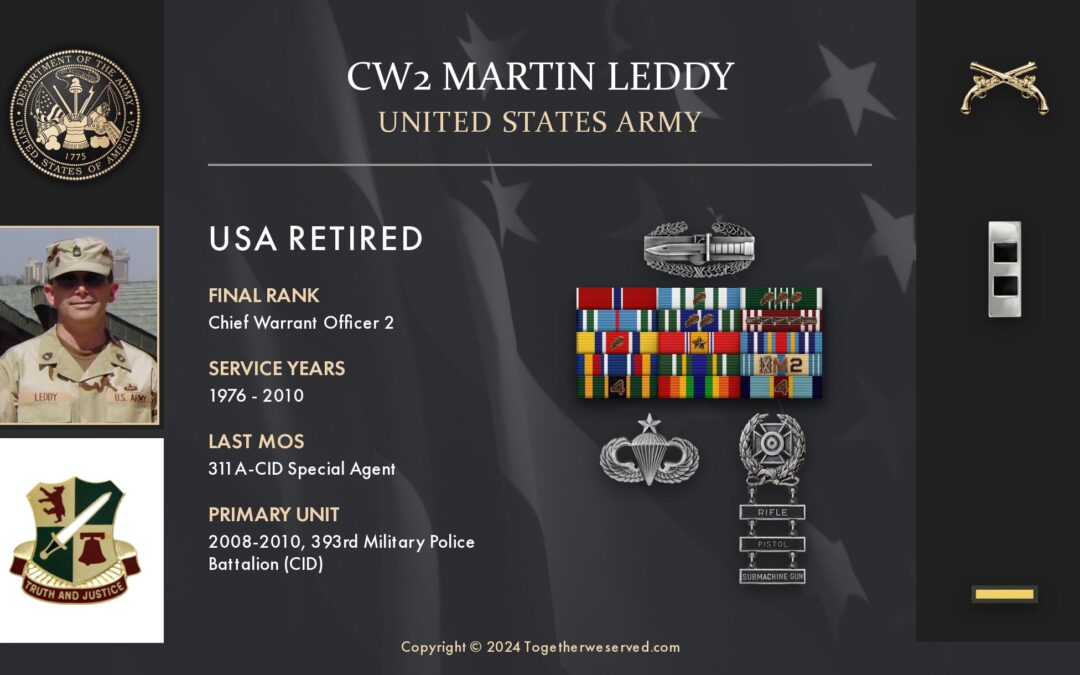
I think it was a series of events. I was influenced by having my college scholarship pulled by the school finance office because they felt my father should pay my way through school. They offered me a full ride, then pulled it before the first day of school. Frustrating.
I went home and found two part-time jobs to help out. Dad had just resigned from the Director of Technical and Vocational Ed at Illinois Central College which he helped found.
Dad had an old Army buddy who had been SF in Vietnam and who was medically retired. He had cancer and came to stay with us for a while. He and I talked a lot about opportunities. I think more than anyone, he influenced my decision to serve. He was truly a great guy.
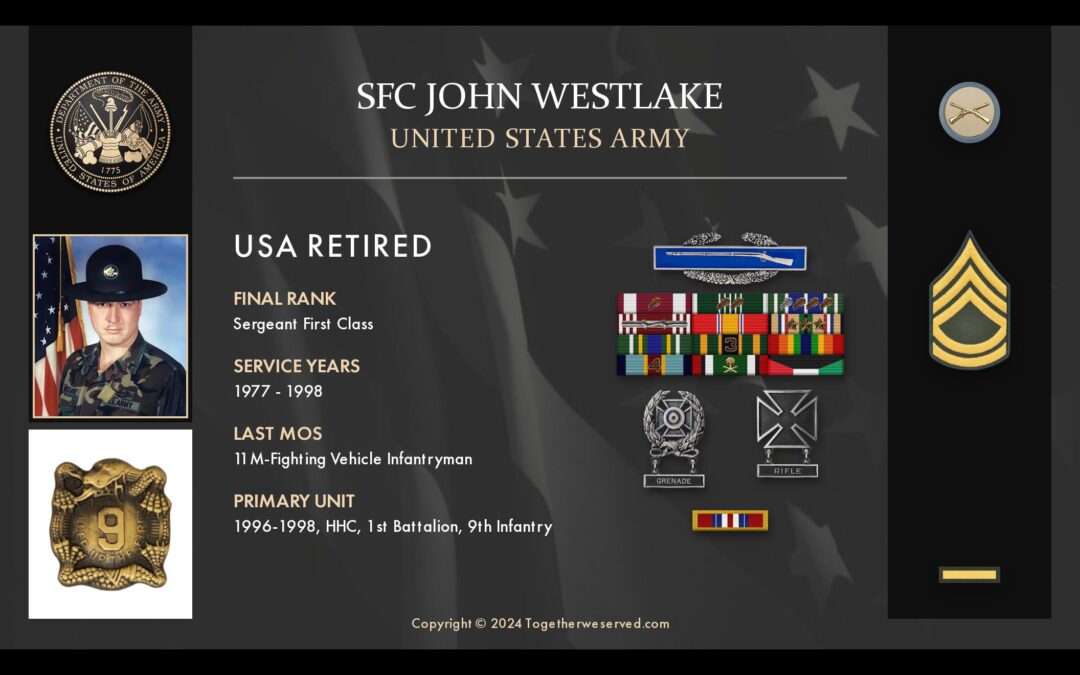
I was influenced by a few factors. I was brought up in a patriotic New England family. I had uncles who fought in Vietnam, Korea, and WWII, and my grandfather on my mother’s side fought in WWI. I remember as a young boy going with most of them to the local Memorial Day parade. We would always stand near a bridge where the parade would stop and a wreath would be thrown into the water.
The other factor that influenced me was the 6 o’clock news. As I was growing up in the ’60s, the Vietnam War was in full swing, and the daily body count of US GI’s and Viet Cong would always be announced. I remember how it bothered me when there were more GI’s killed on any given day than VC. My mind was made up just as I started high school. I wanted to go over there and even the odds. Having grown up on a farm and already having handled rifles and shotguns, I felt I was ready.
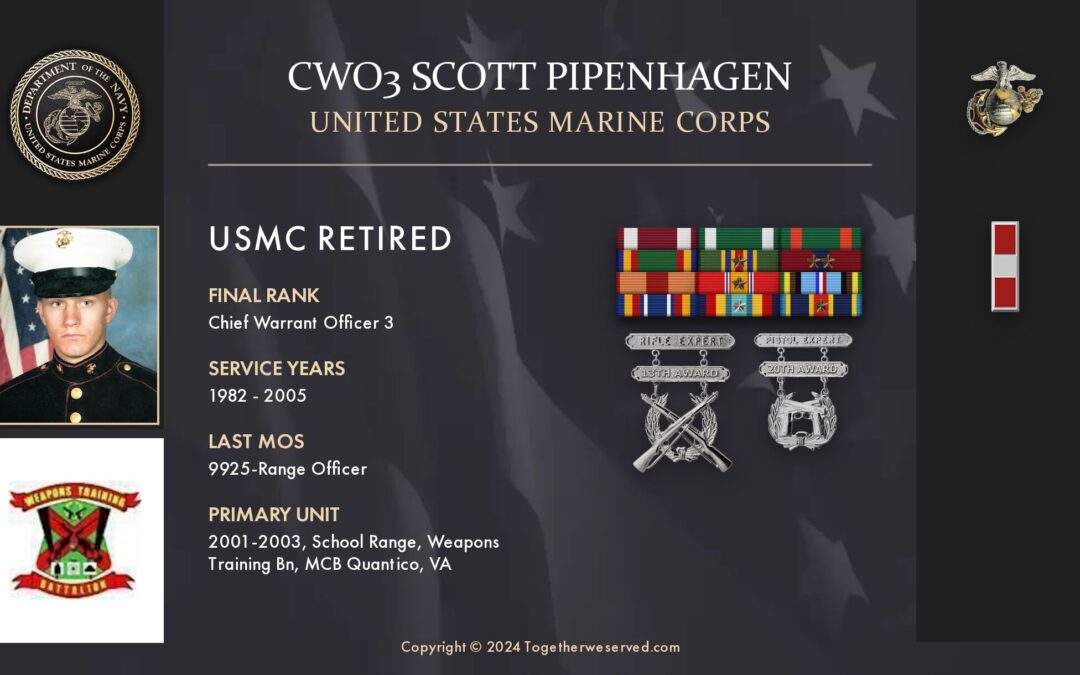
As to why I chose the Marines, it was a no-brainer once I decided to join the military since anything else would leave me wondering if I could have made it in the Marines.
Despite growing up in a family of veterans (Grandpa, Dad, and two Uncles), I never really gave much thought to joining the military myself. This all changed one day when, out of the blue, one of my cousins came to me and said that he was going to talk to the Marine Corps recruiter and wanted me to drive him there. I agreed to drive him and, on the way to the recruiter, he told me about a “Buddy Program” in which we, supposedly, could enlist together and then be stationed together throughout our enlistment. Needless to say, this was probably not the most accurate information, but it sounded good to me.
Once we got to the recruiting station, I had already made up my mind that I needed a change in my life and was going to sign up if my cousin did since I was just wasting money at college and needed a break from schooling.
Bottom line: He did not sign up but I did.
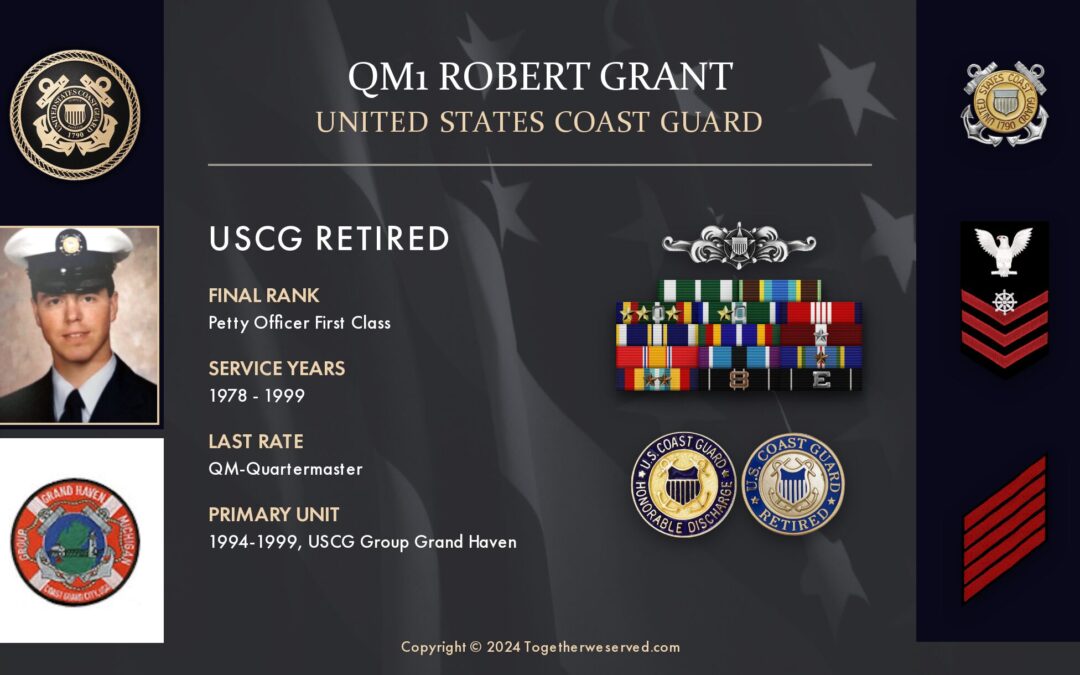
In 1977 I was 19 when we returned home from Australia; my father was an SMSgt assigned to the US Embassy in Canberra and stationed at the RAAF Base in Richmond, New South Wales. I entered Solano Community College, living at home, going to classes full-time and working a midnight to six shift. After a year and a half, I was growing disenchanted with my life. I got off early one morning (about 4 AM in early December 1978) returned home and could not sleep. I turned on the TV and there was a thirty minute (public service) advertisement for the USCG (it was now about 5 AM). I became enthralled as I watched it, 2/3 of the way through the topic changed and focused on at sea drug interdiction in the Caribbean Sea – the narrator described this as “The Coast Guard Goes To War.”
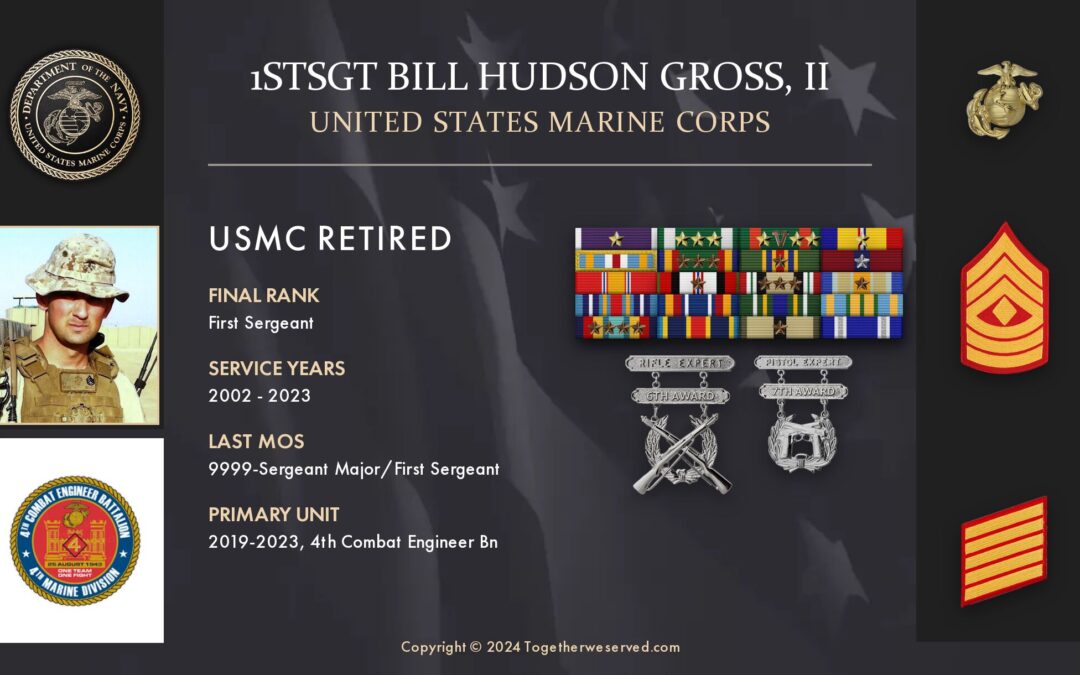
I grew up in rural, southeastern Kentucky and worked with my father and grandfather roofing and working tobacco fields seasonally. My father was a very strict man and most of my youth can be summed up by trying to identify a way to escape my then reality of never leaving my hometown. I participated in NJROTC and sports during high school to keep busy.
During high school, vocationally, and soon after graduation, I worked on a degree and certification in Masonry seemingly solidifying the reality that I would never leave Kentucky. The lack of opportunity teamed with the fall of the twin towers in my Senior Year, AP History led me to pursue the Navy Recruiting office. After multiple visits with no Navy Recruiter in the Office a lean, well-articulated Marine Recruiter approached me. Then, Sergeant Wesley Trucks inquired as to my intentions and made a very strong, positive impact on my tentative decision.
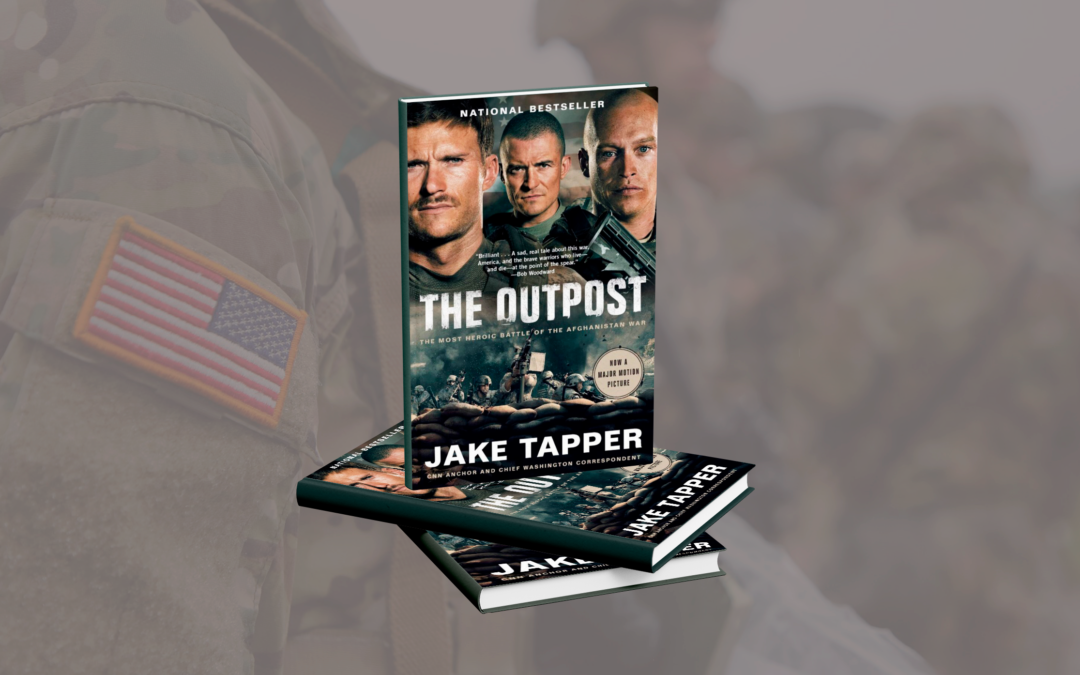
The Outpost is the heartbreaking and inspiring story of one of America's deadliest battles during the war in Afghanistan, acclaimed by critics everywhere as a classic. At 5:58 AM on October 3rd, 2009, Combat Outpost Keating, located in frighteningly vulnerable terrain in Afghanistan just 14 miles from the Pakistani border, was viciously attacked. Though the 53 Americans there prevailed against 40 Taliban fighters, their casualties made it the deadliest fight of the war for the fight for the U.S. that year. Four months after the battle, a Pentagon review revealed that there was no reason for the troops at Keating to have been there in the first place. In The Outpost, Jake Taber gives us the powerful saga of COP Keating, from its establishment to eventual destructions, introducing us to an unforgettable cast of soldiers and their families and to a place and war that has remained profoundly distant to most Americans. Reviews of The Outpost "The Outpost is a mind-boggling,...
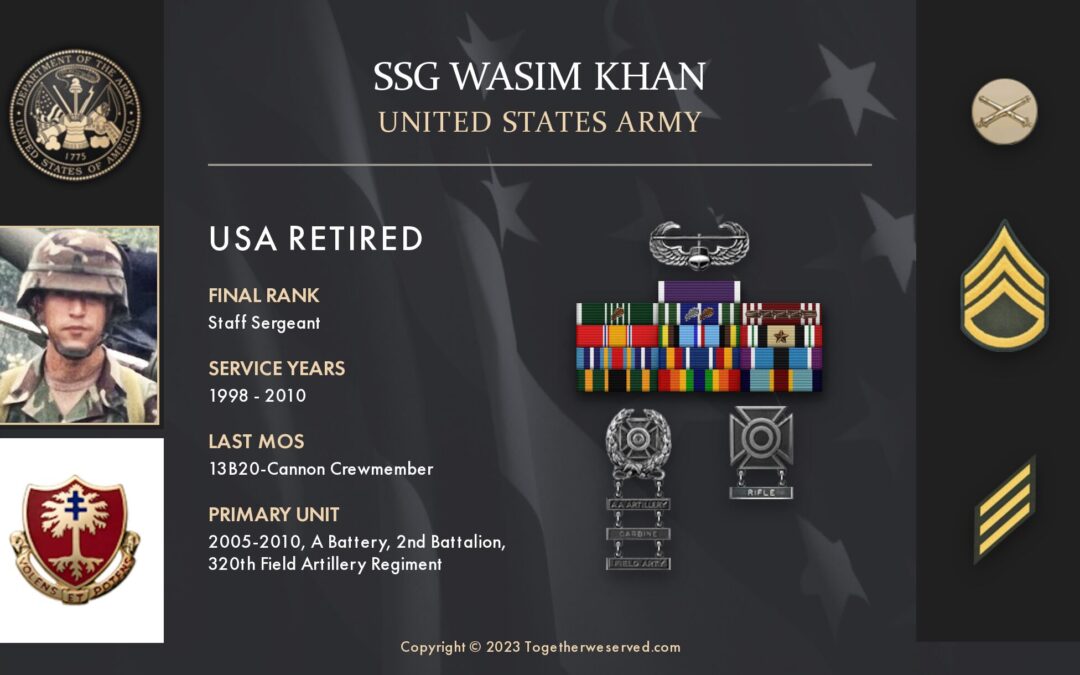
As a kid, I always liked the military. As a young kid, I wanted to join the Navy. When I got to high school, we had Army JROTC, and my interest changed to Army or Marines. My dad, who was in the Army, convinced me that the Army was the way to go because it was bigger and promoted faster. He was a tanker and tried to steer me to armor. I wanted to be an airborne ranger, and my dad said whatever you do, ensure you get what you want in your contract. When I went to the recruiter, I scored very high on the ASVAB. The career counselor told me that he didn’t have airborne infantry available. He said the only thing with airborne was the 31C Radio Operator, probably because of the high GT. I believed him and felt good about getting guaranteed airborne. It first took me to the 82nd, and as soon as I got there, I started applying for a Ranger assignment because I got put in the Engineer Battalion, and it wasn’t what I wanted. After a year and a half, I got my wish and orders for Ranger Indoctrination and the 2nd Ranger Battalion.
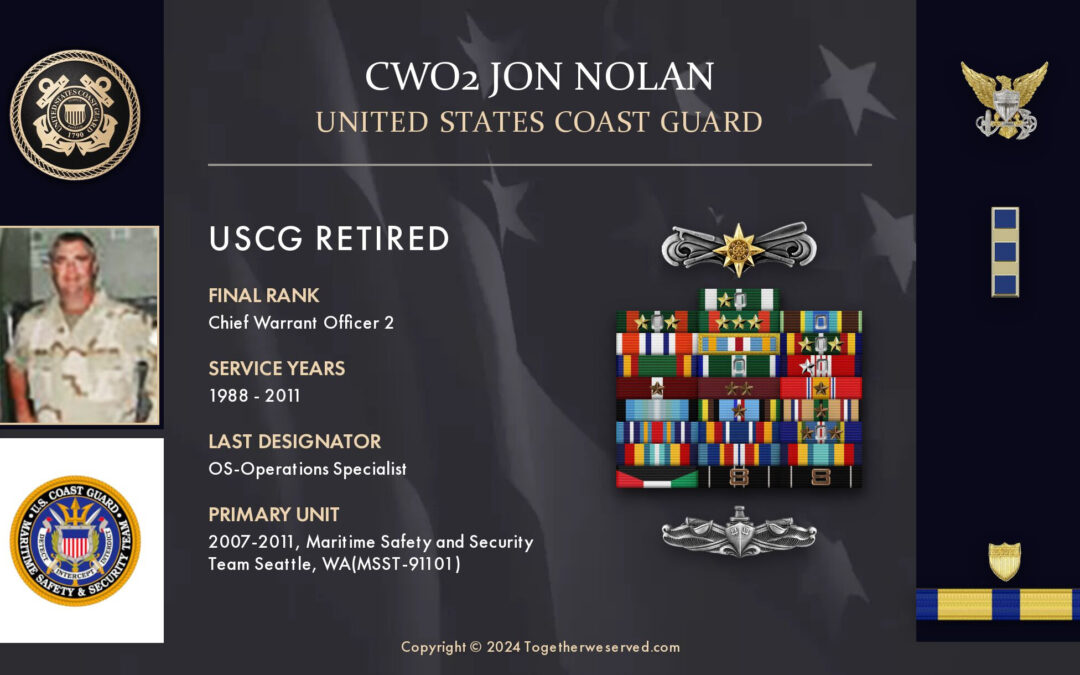
PRESERVING A MILITARY LEGACY FOR FUTURE GENERATIONS The following Reflections represents CWO2 Jon Nolan's legacy of his military service from 1988 to 2011. If you are a Veteran, consider preserving a record of your own military service, including your memories and photographs, on Togetherweserved.com (TWS), the leading archive of living military history. The following Service Reflections is an easy-to-complete self-interview, located on your TWS Military Service Page, which enables you to remember key people and events from your military service and the impact they made on your life. Start recording your own Military Memories HERE. Please describe who or what influenced your decision to join the Coast Guard. I was working for the Liberty County Sheriff's Department. While on patrol, I heard a Coast Guard advertisement on the radio and remember thinking to myself…Hey, I've heard of them. I wanted to leave for the Sheriff's Department and return to action. I took a chance and never...

What was the biggest personal challenge that you encountered during your military service? How did you approach and overcome this?:
As a Navy Ceremonial Guard Casket Bearer, we did 6 funerals daily, 5 days a week in Arlington National Cemetery. However, one funeral in particular was very tough. Everything seemed normal. The car pulled up to the chapel; I removed the urn from the back seat and carried it past the seated family to the front of the chapel. I placed the urn on the small table and made my way out and down to the basement, where we usually waited for the family to speak and pay their final respects upstairs.